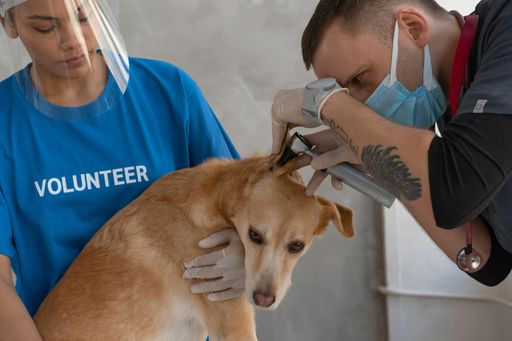Dogs make the best of friends—they’re sweet and always regard their owners with enthusiasm and empathy. We definitely see why to this day, dogs are still the most common long-term furry companions! Dogs can save you from loneliness, a bad day, and in some cases, from all the bad stuff in the world. There are dogs that help sniff out security threats, dogs that help the visually disabled get around, and even dogs that help deliver medicine across battlefields.
Sometimes, it makes you wonder: do we take care of dogs or do they take care of us? Because dogs take such good care of us, it’s our duty as their owners to do the same thing for them. Getting them regular check-ups is definitely one of the biggest return-investments that you can make on your pet for all the love and care that they give.
Dog owners often don’t put a lot of heavy value on routine visits. This is because there don’t seem to be any grace circumstances if those appointments are missed--after all, our furry friends aren’t sick (yet). While we definitely understand this train of thought, it isn’t always sound. There are a lot of seemingly negligible conditions for our canine companions that could escalate into something else very, very quickly.
Keep reading for an in-depth exploration of the different health bullets you could help your pupper doge just by taking them to the vet regularly. Let’s dive into the facts to help you see what’s really at stake!
Heart Infections Are Very Common in Dogs
Canine heart infections usually start at the orthodontic level. Bad oral hygiene causes cavities--and the bacteria that’s built up around the tooth finds its way into the bloodstream from there. While this is sometimes negligible in humans, it’s very different in dogs because they eat a lot of raw meat and wet food.
The most commonly impacted organ is the heart which is very difficult to treat once the infection has become more advanced. Dogs should have a prophylaxis done by experts at least once every three months. The removal of plaque is a very small but wise investment: you can avoid heart ailments, keeping your pet alive for longer.
This is also a cost-effective step although it might look more expensive from the outside. A prophylaxis costs a lot less than medicine, operations, and animal hospital stays.
Just as with any disease, early detection is key: should there be a problem, it will show up in the regular appointments. Stop heart disease before it gets any further--your pets deserve a safe, healthy, happy life.
Some Home Remedies Can Be Dangerous
These days, there’s a YouTube channel for everything--including how to make homeopathic medicine for your pets. Of course, we see why it’s so popular: who doesn’t want a solution that’s free and which you can make in your own kitchen?
Although sometimes, homeopathic cures do work (especially for human beings), it isn’t always wise to apply this same technique to dogs. For one thing, a dog can’t speak up like a human can if something goes wrong. You could be setting a complicated number of infections into motion without knowing it.
This can be especially dangerous if your pet is of a certain age. Older pets have weaker immune systems and they can’t always bounce back from something as seemingly minor as an allergy. Home remedies could lead to inadvertent poisoning and result in accidental pet death.
Going to a clinic guarantees your pet’s access to treatments, salves, medicine, antibiotics, and multivitamins that are all bureau-approved. And should, heaven forbid, something happens to your pet, you’ll have people to hold accountable. Your pet’s health is one thing that you should definitely play it safe with.

Vaccines & Immunization
When you go to the vet, you often get a small booklet that functions a bit like a passport. Your vet stamps on the different shots that they’ve gotten, creating a track record for your dog’s immunization processes. In our modern-day of complex viruses and intense bacterial infections, vaccinations are a must!
If you want your pets to enjoy the great outdoors without getting sick, then it’s very important that you have them vaccinated. Also, vaccinations don’t just benefit your pets: they keep you safe as well.
Getting your fur babies vaccinated for rabies, for example, protects you from when they accidentally bite or scratch. Pets can be carriers for a variety of other diseases--more so dogs because they love to play outside and will eat almost anything that they see. Boost your pets’ quality of life and keep them safe--complete their immunization.
Monitoring Progress
Why, then, isn’t it enough for you to just take your dog to the vet once a year? Why not switch vets depending on where you are? The answer to this is simple: if you do one-shots at a variety of different clinics, they can’t monitor your pet’s progress. They won’t have access to the information of what your pet’s normal behaviors are, what he’s allergic to.
Being familiar with these patterns makes it a lot easier for doctors to diagnose what’s wrong. Age is another important factor: if you start taking your pup to the vet at 2 months old, then your vet will know how to treat him when he’s 2 years old. Aging gracefully is a possibility for our dogs with regular check-ups.
Sure, choosing to take a Saturday out every month to get your dog checked does require effort, time, and money. However, the love and care that our dogs bring us are priceless. Sprinkling a little bit more love and care so we’re sure they lead long, happy lives is a small way to thank them for all their cuddles and playfulness. Keep our health facts in mind as you choose the right vet clinic for you!



















